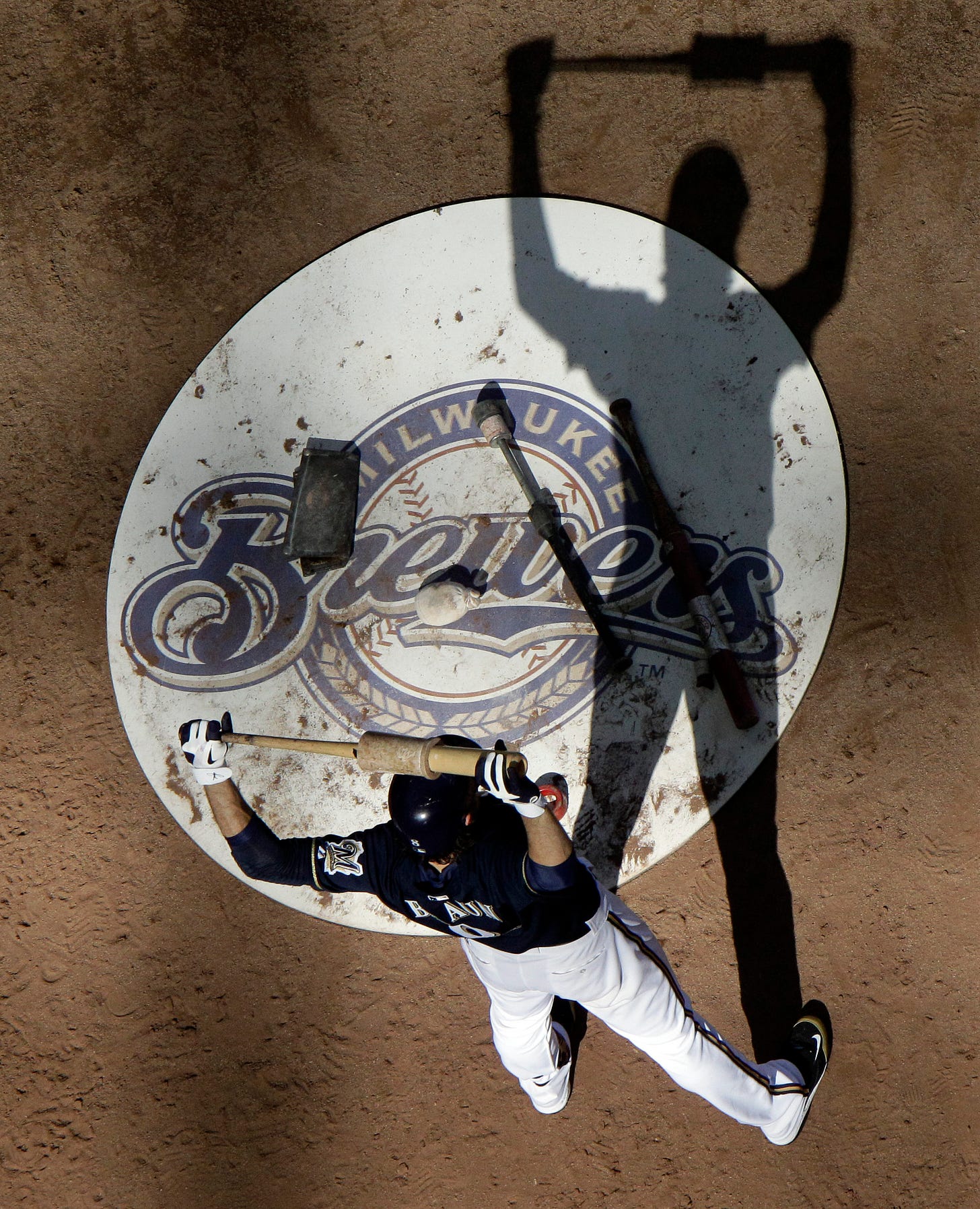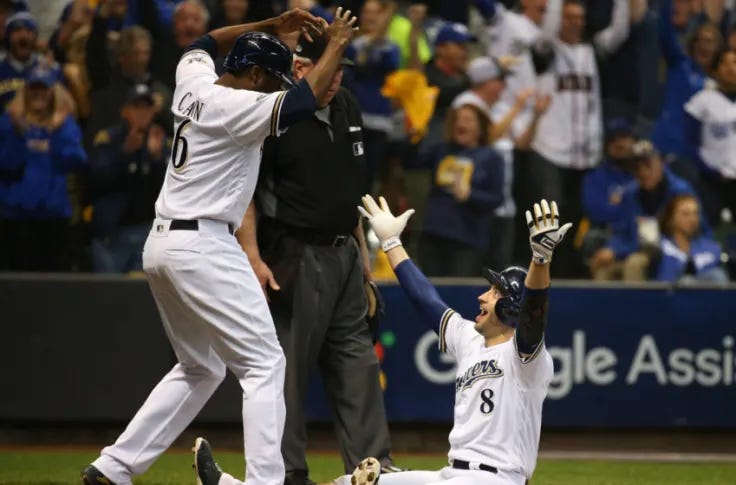On Ryan Braun and legacies
One of the best Brewers of all time retired officially Tuesday. How will he be remembered?
In The Office, there is an episode in which the show’s main character, Michael Scott finds out that his ex, Holly, is coming back to work at his branch for an unspecified amount of time. Michael, still not over her, freaks out upon hearing this news. A coworker who was hired after Holly left the branch the first time, trying to piece the whole situation together, asks who Holly is.
“That is a good question, Erin,” Michael says. “How you describe somebody who is at the same time an old friend, and was a lover, and was a complicated part of my past, and maybe — just maybe — a part of my future?”
On Tuesday, we were all Michael Scott in the moments after the 11 a.m. announcement of Ryan Braun’s official retirement from baseball.
Braun is the epitome of someone who was an old friend. Who the city of Milwaukee loved despite a past that was at times a bit complicated. And he will probably be a part of the Brewers’ future in some form.
How do you describe somebody like Ryan Braun?
Braun’s Baseball Reference page would lead one to believe the answer to that question is simple. He’s a franchise great who hit 352 homers, stole 216 bases, both drove in and scored more than 1,000 runs and just fell shy of 2,000 hits. He won the league’s Most Valuable Player and Rookie of the Year awards and was six times named an All-Star. And he did it all with one team.
Straightforward, right?
To a degree, it is.
In the “greatest Brewer ever” discussion, Braun is undeniably in the top three alongside Robin Yount and Paul Molitor, two players who sit in the Hall of Fame with the ball-and-glove on their caps. No matter how you spin it, Braun was one of the most productive Brewers ever. While few would argue he is above either Yount or Molitor, neither of those two experienced the type of hitting peak that Braun did.
But that peak is exactly where things start to get messy.
Braun’s best season at the plate came in 2011, when he hit .332/.397/.597 and led the league in both slugging and OPS. He became the first Brewers player to win MVP in 24 years and did so playing for the team with the best record in franchise history.
Not long after the season ended, of course, news leaked that Braun had failed a test for performance-enhancing drugs and would be suspended for the first 50 games of the next season. The news came nearly a decade after the height of baseball’s steroid era but the sport had far from forgotten about its checkered (recent) past. In a sense, the timing of Braun’s failed test subjected him to more intense scrutiny than all but a handful of players from the early-to-mid 2000s when steroids were rampant. To have one of MLB’s best young players get caught less than a month after being named MVP? When baseball was supposed to be past its issue with players cheating with PEDs? Talk about playing under a microscope.
The scrutiny, or at least most of it, was put on hold, however. Braun fought the suspension in court and won an appeal. The victory was based on a chain-of-command error, one in which the sample collector did not follow protocol in the timeline of shipping off the sample that tested positive.
Braun would go on to hold an infamous press conference at spring training in which he declared his innocence with bravado.
“If I had done this intentionally or unintentionally, I’d be the first one to step up and say, ‘I did it,” Braun said at the time. “By no means, am I perfect, but if I’ve ever made any mistakes in my life, I’ve taken responsibility for my actions. I truly believe in my heart and I would bet my life that this substance never entered my body at any point.
It was this very press conference, even more so than the failed test, that many would point to in future years when describing their disdain for Braun. Not even 18 months later, Braun would be implicated in the Biogenesis scandal and was suspended 65 games by the league for using PEDs. Not only did he cheat, but he lied about it. And that lie was adamant.
For baseball fans, Braun filled a void as a league wide heel that had been missing since most of the biggest names from the steroid era left the game. He was booed in every ballpark Milwaukee visited (even if the boos seemed to work to the detriment of the team whose park he was in; here’s to you, Wrigley). To this day, there are a lot of baseball fans who still despise Braun. It’s why, unlike you see with many of his contemporaries like Alex Gordon or Dustin Pedroia, there isn’t a widespread celebration of his career taking place. Many aren’t willing to accept his apologies and move on. Is it a response consistent to what other players who were suspended around that time, like Bartolo Colon and Jhonny Peralta, received? Does it matter? It all can be debated. What can’t be is that Braun and no one else put him in this position, and these are the consequences of his actions.
But Braun’s legacy among Brewers fans is much different.
Many swore off ever rooting for Braun again after 2013. Some of those are friends and family of mine. They didn’t want to support someone who cheated and then lied about it. There’s no place in baseball, the common refrain goes, for that kind of thing.
The most common refrain among Brewers fans, though, was a continued support of Braun. He was given a standing ovation in his first game back at Miller Park and continued to be a fan favorite until his last game.
Most, however, continued to support him. A lot of folks would tell you that Brewers fans forgave him, as if the suspension was something they forgot about and overlooked because he continued to play for their team. I’m not so sure of that.
This part of the story is where my personal experience with Braun and his legacy comes into play. Baseball, as a whole, has tended to approach cheating through a black-and-white lense where things either have to be “very good” or “very bad” with no in-between. It’s similar to how I treat the behavior of my dog. There is a level of nuance to the relationship between Braun and Milwaukee that this type of thinking glosses over.
I have a unique perspective on the Braun saga because without it, I probably never would have gone into journalism and would have an entirely different career right now.
In 2012, I had an adorable little blog. It was called Plushdamentals. I was a junior in high school and I was running the school newspaper, but I wanted to go into sports in a different way — working in a front office with some sort of degree that would help out in that facet. I caught wind of a rumor that Braun was going to win his appeal and, long story short, I wrote about the news on my blog and, nine days later, news broke that Braun had won his appeal with the details of the case lining up with what I had “reported” (extreme emphasis on the quotes here).
I was hooked. I talked to reporters from Deadspin, USA Today, local TV stations and a bunch of other outlets that I honestly don’t even remember. But more than the excitement of 15 minutes of fame, I was captivated by the rush of reporting on news. You mean I can write some stuff about sports for a job and people will pay attention? I did some job shadows, talked to professional reporters and, within a few weeks, knew I wanted to go into sports journalism in some way.
Without Braun, does that ever happen? I’m not sure. Does it mean that Braun breaking baseball’s rules and then lying about it is justified because it helped one skinny, mop-haired kid find what he was passionate about? It doesn’t. But it’s another layer to a complicated equation.
You see, Braun’s PED saga didn’t mean that his entire tenure in Milwaukee had to be ruined. Nuance can be had.
For many Brewers fans, Braun represented an entire era of the franchise. He came up as the promised superstar, the kid from SoCal with all of the confidence; the man literally walked up to the plate to Soulja Boy’s “Turn My Swag On.” And he came through on the promise.
After growing up watching teams where Keith Ginter was the second-best hitter in the lineup, it was almost surreal to see Braun, right off the bat, treat big league pitching like a freaking piñata.
Braun was the best player on the first two playoff teams in 26 years. He was still around and still productive when they made three straight postseason appearances nearly a decade later.
Enjoying all those moments for what they were worth doesn’t mean you have to ignore everything else. But everything else doesn’t mean you have to ignore those moments.
For me, nothing will replace how Braun’s walk-off grand slam in the final week of 2008 turned 13-year-old Curt from someone who liked baseball to someone who became obsessed (read: probably too obsessed) with baseball. Or how my brothers and I stormed up and down our street after Braun’s go-ahead jack against the Cubs a few days later. Or watching the player who was a cornerstone of my adolescence turn back the clock during pennant chases when the team was no longer his during the 2018 and ‘19 seasons.
So many of the lasting images of an entire era of baseball are of one player, and that’s Braun. The leap on his way to first after the homer off Bob Howry. The boxing celebration with Prince Fielder. Hoisting the bat like a torch after the homer to clinch the division in 2011. The homer off Castellanos and then off the wall on the final Friday of the 2018 regular season. The RBI single in Game 163. The celebration on the ground after scoring in Game 6 against the Dodgers.
It was a wild 14 years. There was plenty of good, but also some bad. And that’s alright. Not everything has to be binary.
The inside perception of Braun among not only Brewers fans but also the organization itself was in stark contrast to the outside. The franchise celebrates him publicly as one of its greatest players to ever don its uniform. Sparse has been the Brewers' acknowledgment of the skeletons in the closet in recent years.
It’s because, like it or not, Braun is woven into the family of Milwaukee baseball. Nobody has completely forgotten what happened, but the Brewers have made it clear in this instance: they’re not harboring animosity on past sins.
Sure, it's a complicated relationship. But, in a way, it also really isn’t.
Ryan Braun Forever.
Want more free baseball writing in your inbox each week? Subscribe below.





